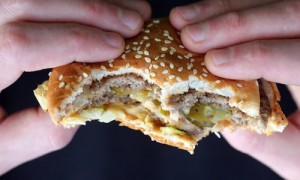Bear feet or bare feet?
熊脚or 赤脚
Bear and bare are often confused when used as verbs. While bare means ‘to uncover (a part of the body or other thing) and expose it to view’, the verb bear relates to carrying or supporting, both literally and figuratively. Bear can, of course, be a noun –denoting the furry animal. Bare, on the other hand, can also be used as an adjective, meaning ‘not clothed or covered’. So it does make quite a difference whether someone has bear feet or bare feet.
Bear和bare在用作动词时经常会被混淆。Bare意思是露出(身体或物品的一部分)让别人可以看到,而动词bear无论字面意义上还是比喻象征意义上,都有承担,支撑的意思。当然,Bear作为名词——说的就是那种毛茸茸的动物(熊啦)。另一方面,Bare也可以作为形容词使用,意思是“没遮盖,赤裸的”。所以一个人是熊脚还是赤脚,意思差了十万八千里。
A stationery car or a stationary car?
文具车or 停着不动的车
Another very common mistake is to confuse stationary and stationery. The two have the same pronunciation and their spelling is very similar, but while stationary is an adjective meaning ‘not moving’, stationery is a noun referring to writing materials.
另一对经常混淆的词是stationary 和stationery。这两个词有相同的发音,他们的拼写也十分相似,但是stationery是一个形容词,意思是“固定的”。而stationery是名词,指的是“文具”。
A dessert island or a desert island?
甜品岛or 荒岛
While the prospect of stranding on a dessert island may sound quite appealing to some, you’d probably be more likely to end up on a desert island after having survived a shipwreck. Similarly to the stationary and stationery confusion, a single letter can make a big difference here. Desert can be used both as a noun and a verb, meaning ‘a waterless, empty area’and ‘to abandon someone’, respectively. A dessert, on the other hand, is the sweet course of a meal.
置身于一座甜品岛上的前景可能听起来对很多人都很有吸引力,但如果是在一起沉船事故中劫后余生的你,可能更希望看到一座荒岛。跟stationary 和stationery 的混淆一样,一个字母的差别意思南辕北辙。Desert可以被用作名词和动词,分别是“沙漠,荒地”和“抛弃,丢开”的意思。而dessert则是甜品的意思。
A supermarket isle or a supermarket aisle?
超市岛or 超市过道?
There may be no such things as dessert islands, but what about supermarket isles? The homophones isle and aisle are both nouns, with the former referring to an island, and the latter to a passage between rows of seats. Thus, you’d perhaps come across an aisle rather than an isle while doing your grocery shopping.
也许甜品岛这样的地方不存在,但超市岛是个什么东东呢?同音异意词isle和aisle都是名词,前者指一座岛,后者则是指一排排座位之间的过道。因此,当你在杂货店采购的时候,你也许是走在过道上,而非岛上。
A gorilla soldier or a guerrilla soldier?
猩猩士兵or 游击队员?
Gorillas are not necessarily known for their combative, militant nature, but guerrillas certainly are. Although gorilla can be informally used to describe a person, or more specifically, ‘a heavily built aggressive-looking man’, in a military context, speaking of guerrilla soldiers makes more sense, as it refers to ‘a member of a small independent group taking part in irregular fighting’.
大猩猩并不被人熟知它好战好斗的本性,但游击队却是。虽然非正式用法,gorilla 可以用以形容一个人,或者更具体的说,“一个外表很有攻击性的男性”,在军事定义中,用guerrilla soldiers(游击队员)显然更合适,因为他是指“一个进行非正规战斗的独立团体的一员”。







